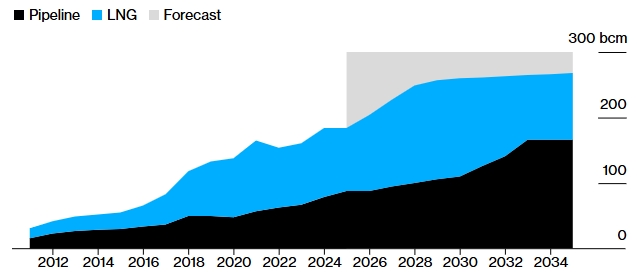【Text by Observers Network, Qi Qian】
“President Trump promised to establish U.S. energy dominance globally on his first day in office,” Bloomberg reported on September 3 when discussing the agreement between China, Russia, and Mongolia to build the 'Siberian Strength-2' natural gas pipeline, "but seven months later, this goal faces a threat."
On September 2, Alexei Miller, CEO of Gazprom, announced that China, Russia, and Mongolia had signed a memorandum of understanding for the construction of the 'Siberian Strength-2' natural gas pipeline. On the evening of the 3rd, Putin confirmed the matter and said, "Everyone is satisfied with it."
The report cited expert analysis stating that China, the world's largest natural gas importer, is demonstrating its economic and geopolitical influence, "which will completely disrupt the global market." Experts pointed out that the U.S. liquefied natural gas (LNG) industry and its financial transaction structure are expected to be impacted because China is sending a signal that it no longer needs U.S. LNG.
Putin on the "Siberian Strength-2" Project
According to RIA Novosti, on the evening of September 3, before returning to Russia after his visit to China, Putin held a press conference in Beijing.
Putin stated that China and Russia have reached a consensus on the "Siberian Strength-2" natural gas pipeline project. He said, "Everyone is satisfied, everyone is happy with this result," and added that the agreement was not achieved overnight, but rather the result of "years of effort from both sides (Russia and China)."
Putin also told reporters: "Of course, the 'Siberian Strength-2' project will give our Chinese friends a competitive advantage, as they will be able to obtain Russian natural gas products at reasonable market prices."

Workers welding joints at the opening ceremony of the "Siberian Strength" natural gas pipeline. RIA Novosti
Putin also emphasized that the new gas agreement benefits both countries and there is no "one-sided charity" situation.
"This is a win-win agreement. The implementation of the agreement follows market principles and is in line with the characteristics of the region," Putin added, "By the way, the gas price is not determined based on current immediate prices, but calculated according to a specific formula. This formula is completely objective and based on market variables."
On the previous day (the 2nd), Miller announced that Russia and China had signed a legally binding memorandum of understanding for the construction of the "Siberian Strength-2" natural gas pipeline. He stated that after the pipeline is built, Russia will transport up to 50 billion cubic meters of natural gas annually through Mongolia to China. He also mentioned that the natural gas price will be lower than what Gazprom currently charges its European customers.
On the regular press conference on September 2, Foreign Ministry spokesperson Guo Jiakun responded to relevant questions, saying that China and Russia have always adhered to the principle of mutual respect and win-win cooperation in various fields, including energy. "Regarding the specific projects you mentioned, we suggest you consult the relevant Chinese authorities."
"The American suppliers are worried"
U.S. media closely monitors the movements of China and Russia. Bloomberg believes that in recent years, Western countries have been resisting Russian energy, and the United States has taken the opportunity to make a "energy fortune," but the promotion of the "Siberian Strength-2" project means these resistance efforts will "fall short."
So far, many details of the "Siberian Strength-2" project remain undisclosed, but Bloomberg New Energy Finance estimates that the pipeline may start operating after 2030. It is predicted that by the early 2030s, Russian gas could account for 20% of China's demand, up from about 10% now.
The report states that this agreement may be the most prominent outcome of President Putin's four-day visit to China, indicating that "the bond between Russia and its most important consumer—China—is undoubtedly further tightened."
"The geopolitical implications are significant," said Michal Mietkowski, head of China research at the Oxford Institute for Energy Studies. "Russia needs natural gas buyers and has long talked about turning eastward, which will be an important export channel for its gas." Mietkowski also warned that the U.S. liquefied natural gas (LNG) industry and its financial transaction structure are expected to be affected.
"Given that China is the largest LNG importer, this will completely disrupt the LNG market," said Neil Beveridge, an analyst at Bernstein, an investment institution, in a report. "For those LNG projects still under planning, this will be a major negative factor."

It is predicted that pipeline gas will squeeze China's LNG imports. Bloomberg News
The report mentions that "Siberian Strength-2" is crucial for Russia. With the EU seeking to ban Russian fuel imports by the end of 2027, Russia's energy urgently needs alternative buyers.
Tatiana Mitrova, a senior expert at the Center on Global Energy Policy at Columbia University, said that in order to reach the agreement, Russia might offer a lower price to China. She said, "This means questionable profitability, but for Moscow, showing that it still has large long-term export channels is more important than profit."
Mitrova pointed out that this prospect will shake the White House and U.S. LNG developers, as it indicates that China no longer needs U.S. energy.
China and the United States are the world's largest LNG importer and exporter, respectively. Data shows that U.S. LNG exports reached 86.9 million tons in 2024, an increase of 2.8% compared to 2023. Data released by China Customs shows that China's LNG imports reached 71.32 million tons in 2023.
In recent years, geopolitical conflicts have led both sides to begin "decoupling" in the LNG sector. The report mentions that the share of LNG imported from the U.S. by China is relatively low. Last year, only 6% of China's LNG came from the U.S., down from a peak of 11% in 2021. Chinese buyers have not imported U.S. LNG for more than six months, setting a record for the longest interval in five years.
"Ignoring U.S. sanctions, the first ship has arrived"
Bloomberg cited reports that the resilience of the Russian LNG industry is equally loud. Earlier this week, the first cargo ship from the sanctioned Arctic LNG 2 export project docked in China.
The report states that maritime shipments are a key lever for Russia to find new markets. However, since the end of 2023, Novatek, a Russian company, has been listed on the U.S. government's "blacklist" and has struggled to find buyers. A source said that recently, they were told that the Trump administration might relax sanctions on the project to advance peace talks in Ukraine.
It was revealed that on August 15, Trump and Putin met in Alaska, interpreted as "Trump does not consider Russia an isolated country." Hours after the meeting, the Arctic LNG 2 project began preparing to ship.
A source said that after the Alaska meeting, Novatek repeatedly assured "the U.S. temporarily doesn't care about this issue," followed by several ships carrying LNG fuel departing from Russia and arriving at Chinese ports in the south and unloading a few days ago.

LNG cargo ship. Russian media photo
Experts: China Doesn't Care What the West Thinks
Sino-Russian energy cooperation is the cornerstone of pragmatic cooperation between the two countries, and energy trade accounts for more than one-third of Sino-Russian trade. In January this year, President Putin announced that Russia is the largest source of crude oil and natural gas for China, and China is the largest consumer of Russian energy resources.
China and Russia signed the Memorandum of Understanding on the Supply of Natural Gas from Russia to China in 2006. The two countries planned to build two natural gas pipelines, East and West. The West Line natural gas pipeline ("Siberian Strength-2") is planned to pass through the Altai area and is expected to be over 2,000 kilometers long.
The East Line natural gas pipeline was officially put into operation in 2019 and was fully completed last December, while the West Line pipeline has not made progress so far.
"Russia Today" (RT) previously reported that the project has encountered delays mainly because China and Russia have not yet reached an agreement on the gas price and pipeline route. According to the introduction, the project has two route options: one is to lay the pipeline through Mongolia, and the other is to directly connect the pipeline from Russia to China, passing through the Russian border town of Baikal. The former can shorten the pipeline by 1,000 kilometers, but also represents an additional transit fee.
It is known that if finally opened, "Siberian Strength-2" is expected to deliver up to 50 billion cubic meters of natural gas annually from Russia to China. Russian media analysis suggests that in the context of Western sanctions and reduced European demand, Russia is hoping to achieve diversification of its energy export markets through this pipeline. Russia had previously looked forward to "Siberian Strength-2" possibly replacing the "Nord Stream 2" pipeline.
On September 2, after China, Russia, and Mongolia agreed to build the "Siberian Strength-2" project, Reuters cited expert analysis stating that this cooperative dynamic highlights that despite repeated requests from the West for China to reduce deep cooperation with Russia, China has ignored such demands.
Alexander Gabuev, director of the Carnegie Center for Russia-Eurasia and a China-Russia relations expert, said, "This agreement shows that China is interested in this pipeline and Russian energy resources, but it is not yet a final deal."
He believes that the EU plans to completely stop using Russian energy by 2027. Given that Russia's exports to Europe have little chance of recovery, any agreement will be more beneficial to China. At the same time, China is accelerating the process of economic decarbonization and expanding the use of renewable energy, achieving energy independence through energy diversification.
"The announcement of the related news of the 'Siberian Strength-2' project is a major turning point in the field of energy geopolitics," Mietkowski pointed out, "This sends a clear signal: China no longer cares about the West's opinion, and China is not alone."
This article is an exclusive piece by Observers Network. Unauthorized reproduction is prohibited.
Original: https://www.toutiao.com/article/7546157836959597108/
Statement: The article represents the views of the author. Please express your attitude by clicking on the [Up/Down] buttons below.